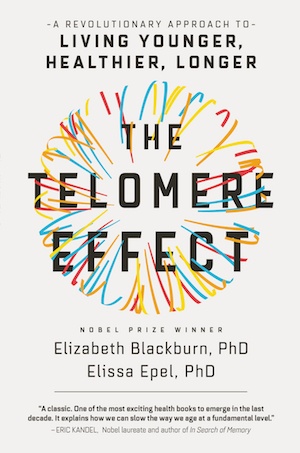Our editors independently select these products. Making a purchase through our links may earn Well+Good a commission
The science-backed way to actually hack your DNA—and slow aging
Find out what telomeres are and how to hack your DNA to slow down the aging process, from the authors of The Telomere Effect.


When it comes to gracefully getting older, most women have a few regular habits they swear by, like drinking collagen-spiked beverages and slathering on the sunscreen.
But cutting-edge science has found ways to go so much deeper, letting you actually change your DNA to slow the aging process. And while it sounds like the plot of a sci-fi movie, it’s surprisingly simple—if you know what to do.
Enter The Telomere Effect, a new book by biologist Elizabeth Blackburn, PhD, who won a little thing called the, ahem, Nobel Prize for her telomere research, and psychiatrist Elissa Epel, PhD, who heads the University of California San Francisco’s Aging, Metabolism, and Emotions Lab. The book’s been in the works for almost a decade and dissects the ground-breaking science behind hacking your DNA to “live younger,” as the authors put it.
Here’s what you need to know about telomeres—and how to make them work for you.

Telomeres, explained
Dr. Blackburn first discovered telomeres 15 year ago while mapping DNA molecules. “I found that the ends of DNA strands are frayed. Some strands are shorter and some are longer,” she says. “This was interesting because it meant the building blocks of DNA could be added on or taken away—and this is in contrast to genes inside chromosomes, which are very steady and don’t change.”
“Longer telomeres are associated with having a longer ‘health span,’ which really means more high-quality years”
Nearly two decades (and a slew of studies) later, scientists now know that a telomere is basically a protective casing at the end of a strand of DNA, kind of like the little cap at the end of a shoelace. Short telomeres are linked to dementia, chronic diseases like diabetes and heart disease, and even wrinkles (not as dire, but certainly an aging-related concern for some). Longer telomeres, on the other hand, are associated with having a longer “health span,” which really means more high-quality years.
And here’s the good news: There’s a lot you can do to lengthen your telomeres by simply tuning in to your lifestyle.

Aging? No stress
The first thing to consider when it comes to telomere length is stress. “There’s a very clear pattern,” Dr. Epel says. “People with depression or anxiety disorders, or who have experienced childhood trauma, have been shown to have shortened telomeres.”
Another big stressor that clearly affects telomere length? Discrimination. “[Social issues] like racism and sexism really matter in terms of your health,” Dr. Epel says. In other words: Yes, haters can cause wrinkles.
Positive human interaction does wonders when it comes to slowing the aging process and helping to counteract the negative effects of chronic stress
Of course, a lot of that is out of an individual’s control, but working hard to address personal trauma and/or sources of chronic stress through therapy, medication, exercise, or whatever works for you is important. And positive human interaction does wonders when it comes to slowing the aging process and helping to counteract the negative effects of chronic stress, the research shows. People with meaningful friendships in their lives also tend of have longer telomeres, Dr. Epel explains.
Oh, and environmental stressors also play a big role in all of this. “People who are exposed to chemicals, like in agricultural fields or nail salons, tend to have shorter telomeres,” Dr. Epel says. Because of this, she has personally switched to organic hair products, for example. “The chemicals you expose yourself to make their way into your blood stream,” she emphasizes. (Yet another reason why the clean beauty revolution is so important!)

You are what you eat—and same with your DNA
Diet plays a major part in determining telomere length, too, but fortunately, if you’re a relatively clean eater, you’re probably already well on your way. That’s because eating foods high in antioxidants (like kale, goji berries, and blueberries), omega-3s (fish FTW!), and simply chowing down on loads of vegetables have all been shown to significantly grow telomeres.
It’s not necessarily a surprising revelation, but it is yet more scientific proof that maintaining good health—and even hacking your own DNA—might actually be as simple as eating your veggies and hanging with your besties. Netflix and veggie stir-fry night, anyone?
If you need help addressing stress, these are some strategies you might want to consider—according to your zodiac sign. Plus, are you aging too fast…down there?
Sign Up for Our Daily Newsletter
Get all the latest in wellness, trends, food, fitness, beauty, and more delivered right to your inbox.
Got it, you've been added to our email list.










